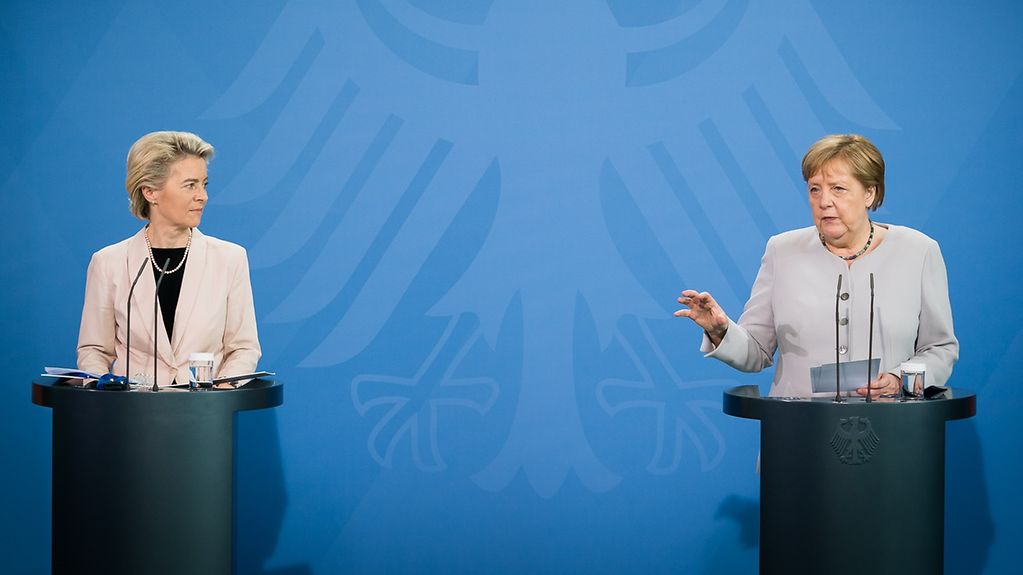German Recovery and Resilience Plan
The EU Commission has approved the German projects under the European recovery plan NextGenerationEU. This was announced by EU Commission President von der Leyen at a meeting with Federal Chancellor Merkel in Berlin. The German Recovery and Resilience Plan focuses on investment in digitalisation and climate protection.
2 min reading time

This will “benefit citizens enormously”, stressed Federal Chancellor Merkel in reference to funding under the Recovery and Resilience Plan.
Photo: Federal Government/Kugler
Ursula von der Leyen “has a positive message for us”, said Federal Chancellor Merkel today during the EU Commission President’s visit to Berlin. The reason for this is that the Commission has approved the projects under the German Recovery and Resilience Plan. “This means Germany will receive 25.6 billion euros,” said von der Leyen. The plan is yet to be approved by the Council, however.
“This money will be spent on our future”
Agreement on NextGenerationEU last year was a crucial response to the pandemic, said the Federal Chancellor. The programme is designed to help cushion the impact of the pandemic on the economy and society. Merkel said she was pleased that all member states had now implemented the necessary ratifications of the Own Resources Decision. As she explained, “this money will be spent on our future – with a particular focus on climate protection and digitalisation.” Specifically, the Federal Chancellor added: “We will be investing in hydrogen, microelectronics, the cloud and IT.”
Exemplary digital project in Cologne
Together with the Commission President, the Federal Chancellor paid a virtual visit to the Cologne public health office. Here they found out about newly launched digital projects geared towards “networked contact person management”. The Cologne initiative is a good example of the kind of project the Federal Government is seeking to promote under the German Recovery and Resilience Plan.
Merkel was impressed by what she saw in Cologne: the solutions for digital administration presented at the public health office were pioneering, she said. She particularly praised the idea of being able to respond intelligently to pandemics on a district-by-district basis. “This is the kind of solution we now need to roll out on a nationwide basis. It will fundamentally change the work of our public health authorities – as we’ve just been able to see for ourselves.” Based on targeted contact tracing, the Cologne authority is able to identify where infections are happening, where vaccinations are required and how to move forward swiftly.
Focus on climate protection and digitalisation
Commission President von der Leyen highlighted other key funding projects under the German recovery plan. These include a renovation programme worth 2.5 billion euros to help make buildings more energy-efficient. Measures here range from facade insulation to state-of-the-art heating systems that are clean and sustainable. 5.4 billion euros will go into clean mobility, too – subsidies for electric vehicles as well as funding for charging infrastructure and the replacement of diesel buses with electrically powered buses. A cross-border European hydrogen production project will cover the electrolysis capacity along with the entire infrastructure including industrial application. The investment sum here will be 1.5 billion euros. In addition, investments totalling three billion euros will go into the digitalisation of public administration.
The total volume of the German Recovery and Resilience Plan is 25.6 billion euros. It has yet to be approved by the EU Council. A positive decision is expected before the end of July.